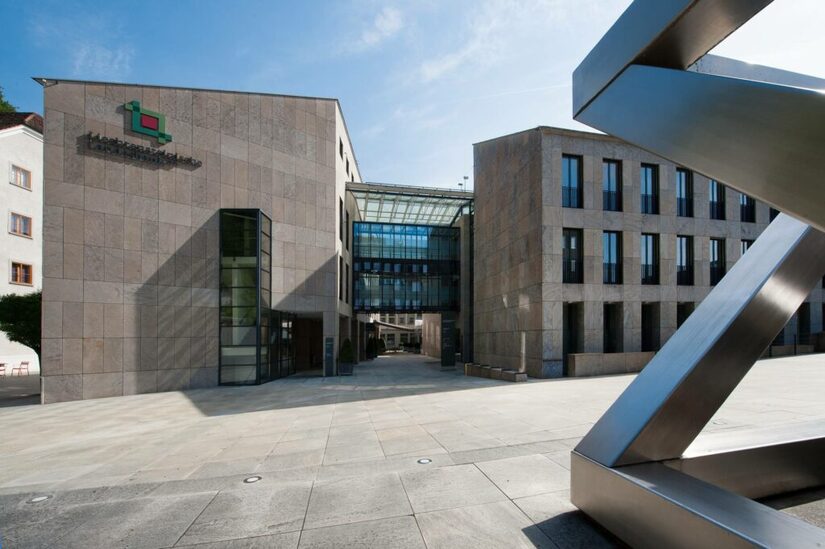Liechtensteinische Landesbank: A profile and review
If you have any questions or want to invest as an expat or high-net-worth individual, you can email me (advice@adamfayed.com) or use these contact options.
Table of Contents
Introduction
When creating an account with a bank, especially one that is state-owned like Liechtensteinische Landesbank, it pays to know who you are dealing with.
Liechtensteinische Landesbank AG is one of the largest banks in Liechtenstein, providing a wide range of financial services. The state owns a majority stake in the bank and as such holds a deep history with the country and its people.
The bank was founded in 1923 and has been operating ever since. The bank’s mission statement is to offer the best financial services to its customers in Liechtenstein and neighbouring countries.
In recent decades, Liechtensteinische Landesbank has increased its offerings to include various investment products, loans and insurance services. These products are primarily available to private individuals and businesses.
Most notably, it has also been listed as a company at the Swiss Stock Exchange (LLBN) since 1993, with the majority of shares owned by the Liechtenstein state.
In this article, we will discuss the bank’s history, its services, performance, and how it plays a part in Liechtenstein’s economy, to give you adequate information whether or not you should conduct business with the bank.

What is Liechtensteinische Landesbank?
Liechtensteinische Landesbank has its headquarters in Vaduz, capital city of Liechtenstein. It is primarily a retail and corporate client base-focused institution with assets under management of $5 billion as at 31 December 2018.
The Liechtensteinische Landesbank is the universal bank in Liechtenstein with the most extensive history, but it only makes up one part of the LLB Group’s three banks and two competence centers.
Bank Linth, a division of the group, is the biggest neighborhood bank in Eastern Switzerland, while Liechtensteinische Landesbank Österreich is an asset management bank in Austria. In all of them, the group claims that LLB Asset Management’s strengths is its expertise in investments.
In addition, the LLB Group, which is supported by three entities—the Fund Services competence center in Vaduz, the fund service provider LLB Swiss Investment in Zurich, and the fund subsidiaries LLB Invest and LLB Immo in Vienna—is establishing a reputation as a fund powerhouse in the Liechtenstein-Austria-Switzerland region.
Essentially, the LLB Group is a full-service bank network with specific expertise in institutional and private banking. High net worth individuals in the state can find that the Vaduz-based Liechtensteinische Landesbank has been providing service clients for 160 years to build the reputation it has today.
In terms of organizational structure, the LLB Group has Retail & Corporate Banking, Private Banking, and Institutional Clients as its three market segments. The group mainly concentrates on the domestic markets in Liechtenstein, Switzerland, and Austria as well as the traditional cross-border markets in Germany and the rest of Western Europe as well as the Middle East’s emerging markets.
If you are a high net worth individual or an investor within that region, there is a high chance that you have heard of or have already conducted business with the bank’s network or affiliates.
History and operations
As the state bank of Liechtenstein, Liechtensteinische Landesbank is also among the oldest in the European region. And because of its nature, to fully understand the history of the bank, we must also talk about the history of the state of Liechtenstein itself.
Liechtenstein is a microstate in the middle of the Alps, a little over 62 square miles or 160 square kilometers in size. It is the fourth smallest country in Europe and the sixth smallest in the world. It has a population just around 40,000 people as of 2020.
Yet, despite its small size, the country’s economy is ranked as one of the most stable in Europe thanks to its low taxes and political stability, which makes it an ideal location for investors looking for safe haven with their money.
Liechtenstein is a constitutional monarchy. It has been a member of the United Nations since 1990, and it’s also a member of the European Economic Area (EEA).
The state also has a rich history that dates back to even before the Middle Ages, as far back as the Iron Age in ancient history.
The Liechtensteinische Landesbank itself, however, claims that its history had started with the establishment of “Zins- und Credit-Landes-Anstalt” in Vaduz on December 5, 1861.
This particular period marked the start of the reforms that were furthered by the 1862 adoption of the first Liechtenstein Constitution. The transformation of Liechtenstein into a cutting-edge corporate hub had begun.
After the First World War, Liechtenstein became more democratic, and in 1923 the LLB, then known as the “Sparkasse,” was given certain autonomy along with an “unlimited state guarantee” with a tax exemption.
It was only then that LLB became a real bank founded with progressive capital requirements, as os standardized internationally today.
In 1924, Liechtenstein’s border with the Swiss economic zone was opened by the Customs Treaty with Switzerland.
That was when the Swiss Franc was adopted as the national currency, and the bank’s current relationship with the Zurich financial district were all established.
Following World War II, the financial institution evolved into a global bank with clients from all over the world. The LLB was renamed “Liechtensteinische Landesbank” in 1955. The 1970s saw the start of the business of asset management and investments expanding.
The Liechtensteinische Landesbank was given permission to open subsidiaries and branches abroad under a new law enacted in 1981.
The LLB did not make this decision until 1993, when it underwent a partial privatization and went public on the SIX Swiss Exchange.
The group increased its operations in Switzerland and entered new markets, opening branches there in 2005 and 2008 as well as establishing Liechtensteinische Landesbank Österreich in Vienna in 2009.
In 2007, the group then purchased a 74.8 percent stake in the regional Swiss bank Bank Linth.
After the global 2008 financial crisis hit, the LLB Group undertook a repositioning in 2013 with a new strategy in response to the fundamental changes happening in the banking industry.
The LLB Group has since then concentrated on Liechtenstein, Switzerland, and Austria’s domestic markets, as well as Germany and the rest of Western Europe’s traditional cross-border markets and the Middle East’s emerging markets.
The Liechtensteinische Landesbank Group is now aiming for sustainable profitable growth as part of its StepUp2020 plan, outlining four fundamental components of growth, profitability, innovation, and quality that have been its main focus since 2016.
The new ACT-26 plan will prioritize growth, efficiency, and sustainability for the following five years. ACT-26 promotes the continuance of profitable expansion and technical and sustainable change.
Services
The Liechtensteinische Landesbank offers its customers a wide range of financial services. These include products and services in the commercial, private, and retail banking sectors.
Current accounts, savings accounts, debit cards, credit cards, investment funds, structured products, mortgage loans, and lombard loans are just a few of the products on offer.
You can open accounts online through the bank’s website. Naturally, the bank conducts its KYC/AML checks when beginning a business connection with a new client due to regulatory requirements.
Upon application, a private individual must provide documentation during onboarding, particularly a passport and a proof of address.
Liechtensteinische Landesbank AG will also request corporate papers and information on controlling individuals from corporate clients.
Depending on the circumstances, the bank also reserves the right to ask for further proof of identity or data.
Liechtensteinische Landesbank AG participates in the deposit guarantee scheme of Liechtenstein, meaning that deposits are covered up to 100,000 CHF per bank and per depositor and the guarantee is applicable to all types of account balances kept in a name formed by natural persons (Liechtenstein and abroad), corporations, and other legal entities.
The Liechtensteinische Landesbank AG participates in and provides contributions to the Deposit Guarantee and Investor Compensation Foundation PCC (EAS).
Financial performance
As far as financial performance, the LLB Group had a very successful year in 2021, characterized mostly by strong expansion, and this upward trend continued in the first half of 2022 through both net new funding and customer loans.
The LLB Group generated CHF 2.5 billion in net new money, or an annualized growth rate of 5.5%, as a result of aggressive marketing and sales initiatives. This positive development was facilitated by all booking centers as well as market divisions.
Regarding its business strategy, the LLB Group announced that its implementation of its ACT-26 strategy is seeing a strong start, with steady, profitable expansion in an unfavorable economic climate. According to company data, growth, efficiency, and sustainability are being implemented in the three main areas as planned.
The first strategic objectives are being realized in the instance of its digital transformation program LLB.ONE to further build cutting-edge client interfaces, speed up and streamline internal processes, and generally boost the scalability of the company.
The LLB Group is also moving forward quickly in the sustainability sector. By introducing new dark green ‘Impact Investment Funds’ and the entirely digital, sustainable ‘wiLLBe’ asset management app, it has widened the spectrum of its sustainable offerings.
Investors looking into the LLB Group’s sustainability initiatives will also find that the bank is working to cut its own carbon emissions in addition to these actions.
It joined the Climate Pledge as a recognized partner in March 2022. In this regard, it has committed to implementing the Paris Climate Agreement and achieving climate neutrality ten years earlier than agreed upon, making it the first bank in Liechtenstein, Switzerland, and Austria to do so.
The bank is confident it will maintain its positive performance despite a challenging market environment with uncertain factors like escalating geopolitical situation in Europe, rising inflation, fears of an economic recession and the lingering impact of the coronavirus pandemic.
“In the first six months of this year, we have again proven that we can master difficult business conditions and continue to grow successfully and forge ahead with the positive development of the LLB Group. We expect to achieve a solid result for the full 2022 business year”, Group CEO Gabriel Brenna said in the bank’s latest financial statement.
Rating
The LLB is rated by the Moody’s rating agency as follows:
- Bank deposit rating: Aa2
- Issuer rating: Aa3
- Counterparty risk rating: Aa1
- Outlook: Stable
The following factors, according to Moody’s, are particularly important for the LLB’s favorable rating: the stable market environment in Switzerland and Liechtenstein; solid fundamental financial data; good liquidity and refinancing situation; and stable ownership structure (at least 51% owned by the Principality of Liechtenstein).
Should you make an account or invest with Liechtensteinische Landesbank?
Despite Liechtenstein being a tiny state with a population of less than 40,000 people, it is widely regarded as having one of the strongest financial systems in Europe. It is also seen as one of the richest countries in the world.
Liechtenstein has consistently ranked as one of Europe’s most prosperous countries. The government uses low taxes to attract foreign investment and promote economic growth through sound monetary policy.
As such, Liechtenstein has long been a safe haven for the world’s rich and powerful, thanks these factors alongside strong political leadership, a relative lack of corruption and the fact that it is favorably positioned between other wealthy neighbors in the European Union.
With all these factors in its favor, Liechtenstein is a great place to invest if you want to feel safe with your money. And as the state-owned bank, Liechtensteinische Landesbank is a fine, widely regarded choice of bank.
However, do keep in mind that there are drawbacks with investing in a bank.

What are the drawbacks I should keep in mind before investing my money?
In general, bank interest rates are lower than the returns on other types of investments. Your money might not be able to keep up with inflation—the gradual rise in the cost of goods and services—when you take income taxes on interest into account.
In fact, the International Monetary Fund predicts global inflation to reach 6.6 percent in 2023 and 4.3 percent in 2024.
This is far higher than what most banks offer on interest rates, and if you want your money to grow faster than inflation, then you need to explore other options.
You do not want the purchasing power of your money to decrease. For instance, if you earn 4% annually in a savings account, pay a third of it in taxes, and inflation is 6% annually, then you end up losing more than what you put in the first place.
This is not to mention that banks can assess fees that can be greater than the rate of interest on your account and deplete your investment.
Some charges, such a maintenance fee or ATM fees, could be included as standard with a specific account.
If you don’t satisfy specific criteria, such a minimum balance, a bank may levy additional fees or even reduce your interest rate.
It is highly recommended you seek the help of a financial advisor or a trusted personal financial planner to determine the best options available to you for you to reach your financial goals.
Conclusion
Liechtenstein has a lot going for it. It’s a small country with strong political leadership and a long history of financial stability.
The country has long been a haven for the world’s rich and powerful, thanks to a variety of factors from strong political leadership, low taxes, to a long history of development. With all these factors in its favor, Liechtenstein is a great place to do business and invest in.
And because of its status as the state-owned bank of Liechtenstein, Liechtensteinische Landesbank enjoys a reputation of being one of the best choices for banks in the region.
Pained by financial indecision? Want to invest with Adam?

Adam is an internationally recognised author on financial matters, with over 760.2 million answer views on Quora.com, a widely sold book on Amazon, and a contributor on Forbes.



